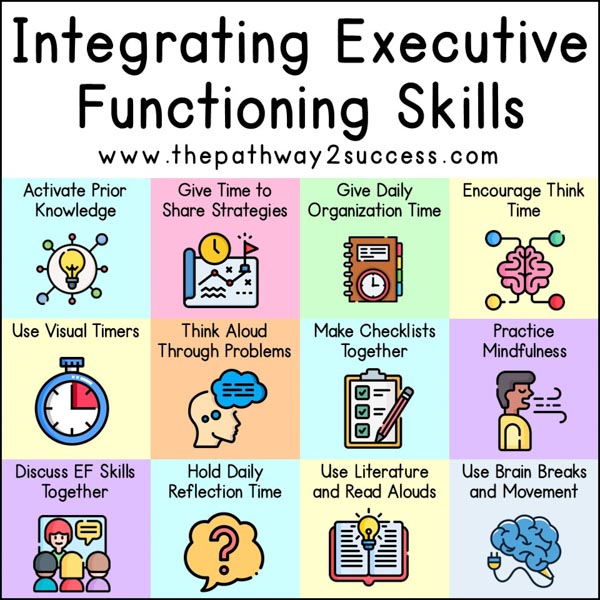
Every teacher is a teacher of executive functioning skills. That’s because skills like planning, organization, attention, and time management are in everything we do.
Why integrate executive functioning skills?
To understand why it’s valuable to integrate executive functioning skills, it’s important to what these skills are. Executive functioning skills are the core brain-based abilities that help us accomplish everyday tasks and goals. They include abilities like planning, organizing, getting started on tasks, managing our time well, staying focused, and problem-solving through challenges.
Clearly, these abilities are used within every subject and content area. This is true whether a student is working on a 4th grade math assignment, 8th grade English essay, or middle school art project. Every day, students need to plan writing assignments, problem-solve through challenging questions, manage their time on assessments, and stay focused during lessons.
As educators, when we teach and support these skills in the classroom, we are providing the foundation all learners need to be successful.

Integrate executive functioning skills and strategies into your existing lessons
Every educator has the power to intentionally target executive functioning skills during the day. Best of all, teachers can use their existing curriculum, lessons, and content. It doesn’t have to be complicated! Here are some simple suggestions to blend executive functioning skills with what you are already doing, separated by executive functioning skill. Use the strategies that work best for you and your learners:

Planning
Planning is the ability to understand what you need to accomplish a goal and create steps to get there.
- Graphic Organizers – Start writing assignments using visual supports like graphic organizers to help students plan, outline, and organize.
- Develop Goals – Help students write specific goals for themselves. Keep these goals in a student binder and review them on a regular basis.
- Highlight Student Objectives – Help students understand where they are going by identifying and discussing student objectives for a lesson or activity.
- Visualize the End Result – Before starting a task, encourage students to picture the end result in their mind. It also helps to introduce models, examples, and exemplars of student work.
Metacognition
Metacognition is thinking about your own thinking.
- Activate Prior Knowledge – Before starting a new unit, have students discuss what they already know about that topic and what they think they will learn.
- Share Strategies – Give time for students to explain, discuss, and teach the strategy they used to solve a particular problem. Allow other students to ask questions and share differing solutions for the same problem.
- Think Alouds – Spend time modeling your own thought process while solving a problem or reading through a text.
- Relate EF Skills to Content – Explicitly highlight when you are using planning, organization, or task initiation in your lessons and activities. Use these free executive functioning posters to start the conversation.

Organization
Organization is the process of keeping materials and information in order.
- Teach Your Organization System – Every educator has their own unique way of organizing materials, binders, and content. Take time to explicitly teach this to your students (and re-teach it throughout the year).
- Give Daily Organization Time – Integrate a few minutes of extra organization time into your day. During this time, students can tidy up binders, sort papers, and write in planners.
- Notebook Clean-Outs – After finishing up a unit, go through notebooks and binders with students. Discuss which materials should remain in their binders and which can be removed.
Task Initiation
Task initiation is the ability to get started on a task in a timely manner.
- Get Started Strategies – Make a list of “get started strategies” such as using positive self-talk, asking a friend, and making a list. Keep these posted as reminders.
- First One Together – After assigning an activity, complete the first problem or question together to give momentum.
- Offer Choices – When it is time for independent work, allow students to choose between two or tree different options to give them a boost.
Attention
Attention is the ability to focus effectively on tasks, people, and ideas.
- Write To-Do Lists – Alongside students, create to-do lists for assignments, projects, and activities. Students can use this checklist to stay focused on on-task as they work through the activity on their own.
- Focus Strategies – Make a list of “focus strategies” such as mindful breathing, stretching, and using positive self-talk. Keep these posted as reminders or discuss them before focus sessions.
- Brain Breaks – Add brain breaks between tasks and transitions to improve focus and thinking abilities.
- Practice Mindfulness – Use evidence-based mindfulness activities like deep breathing or mindful coloring to help train brains for focus. Directly address focus skills with these attention coloring pages.
- Ready Check – Prior to a working session, encourage students to do a “ready check.” What is your goal? Do you have everything you need? Are your distractions put away?

Time Management
Time management is the ability to use time effectively and efficiently to achieve goals.
- Chunk Assignments – Alongside students, break apart longer projects and activities into sections. Come up with “mini-deadlines” for each section to keep learners on track.
- Calendar Review – Keep a weekly and/or monthly calendar posted in the classroom. Take time to review it, looking ahead to long-term projects, assignments, and quizzes.
- Visual Timer – Use a visual timer during working sessions to help students visually see how much time is left.
- Time Estimation – Before completing a task, encourage students to estimate how long they think it will take them.
Self-Monitoring
Self-monitoring is checking in on yourself to meet your goals.
- Checklists – Create checklists with students for a task they are about to complete. Have students use the checklist to keep them on track as they go.
- Check In Breaks – Pause working sessions for a “check in break.” During this time, have students ask themselves: How am I doing? Am I on track? What is going well? What could I improve?
- Check Work – Prior to turning in assignments, create a routine for students to revisit, check, and re-do their work to make sure it’s accurate.
Self-Control
Self-control is the ability stop and think before making a choice.
- Think Time – Ask a question and give ample time for students to think, brainstorm and ponder before discussing the answer.
- Mindful Breathing Breaks – Add mindful breathing breaks to build focus and strengthen self-control skills.
- Stop and Think – After assigning an activity or task, give students a quick “stop and think” think. Encourage them to pause, think about what they need, and what steps they are about to take.
- Use Self-Control Scenarios – Discuss real-life self-control scenarios related to your content and class, encouraging students to pause and think: What would you do? Why? For example, you might ask, “You’re working in your math group when someone else comes up and starts getting you off track. What would you do? Why?”
Perseverance and Problem-Solving
Perseverance is working through challenges to complete a goal.
- Perseverance Share – After completing a task or activity, have students reflect and share: What strategies worked well for you? What challenges got in your way? How did you persevere?
- Celebrate Wins – Give time for students to share their individuals wins, big and small.
- The Power of Yet – Before learning a new skill or ability, remind students that they just haven’t learned it yet. With hard work and persistence, anything is possible.
- Group Challenges – Integrate challenges and puzzles into your class content. Group challenges can be especially beneficial, as students must work together to achieve a shared goal.
- Perseverance Shoutouts – Recognize students who are demonstrating strong levels of perseverance throughout the day.
- End of the Day Reflection – Spend a few minutes reflecting to boost perseverance and confidence for the next day. Use these free reflection questions for an end of the day reflection time.

Flexible Thinking
Flexible thinking means considering different perspectives and adapting to change.
- Learning Reflection – After learning about a topic or unit, have students reflect on what they’ve learned. Specifically highlight how thinking has changed over time.
- Alternate Perspectives – When someone gives an answer or shares an idea, encourage students to think of an alternate perspective for that same idea. How else might someone think? What might be another solution?
- Group Discussions – Holding group discussions on any topic can allow for shared ideas, perspective-taking, and learning. Encourage kids to ask each other questions, stay open-minded, and consider seeing situations from different angles.
Continue building executive functioning skills
In addition to integrating executive functioning skills into your current content, you can also carve out short periods of time to directly teach and discuss these skills. While it’s helpful to have longer periods to discuss these skills, note that it doesn’t have to be a full time block. Sometimes mini-lessons provide just the right amount of information to introduce, comprehend, and build the skills learners need. Because you can then always return to integrating those skills into your content throughout the entire year.
Executive Functioning Lessons and Activities
Teach about executive functioning skills explicitly using lessons and activities. Discuss what each skill means, why it’s important, and how learners can strengthen that skill over time. From planning to perseverance, each executive functioning skill matters for kids and teens. Learn more about executive functioning lessons and activities for the year.

Executive Functioning Word of the Day
Target a word or phrase of the day with an executive functioning focus. Every word includes an explanation with guided questions to get your students thinking! Some favorite words to try include neuroplasticity, momentum, challenge, routine, adapt, and self-discipline.

Executive Functioning Discussion Questions
Get kids and teens talking with executive functioning focused questions. How can making a list help you prioritize what you need to accomplish? How is self-control related to positive decision-making skills? How can flexible thing help solve problems? These questions open the door to lots of executive functioning strategies, supports, and growth.

Executive Functioning Quote of the Day
Start your day with an executive functioning quote. Come up with your own daily quote or use this full year executive functioning quote of the day set. Not only is every quote motivational and engaging, but they all target critical skills like organization, attention, self-control, perseverance, and problem-solving. Spend just a few minutes to read the quote, discuss, and highlight that idea throughout your day. This is a really simple way to sprinkle executive functioning skills and strategies into your day.

Read Alouds
Any read aloud story can be used to highlight a host of executive functioning skills and abilities. To get started, just choose a favorite read aloud book and read! Pause and discuss as you notice different skills in action. For example: What good choices are the characters making right now? What problems are the characters dealing with? How did the character persevere through their challenge? Use this free list of executive functioning read alouds to give you a jump start!

Final Thoughts
As an educator, you are already teaching skills that build executive functioning. By intentionally focusing on these skills during your lessons and activities, you can empower students to become more independent, resilient, and successful learners – not just in your classroom, but in life.






Leave a Reply